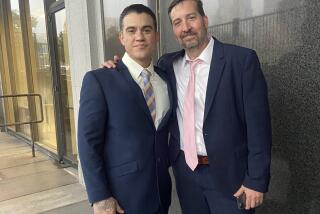1989 Murder Conviction Is Overturned : Courts: Appellate panel rules that witness’s testimony about Westminster shooting was based on hearsay. The ruling allows a retrial.
- Share via
SAN FRANCISCO — A federal appeals court overturned an Orange County murder conviction Friday because a witness, when asked how she knew that the defendant was the gunman, said, “People were talking.”
That hearsay testimony, by a woman who first came forward five years after the killing to seek a $5,000 reward, should not have been used against Paul Albert Guardado, said the U.S. 9th Circuit Court of Appeals.
The court said the woman’s firsthand, non-hearsay observations failed to establish that Guardado was even holding a gun at the time of the 1979 murder. The ruling allows a retrial.
Guardado was convicted in 1989 of second-degree murder in the September, 1979, killing of Steven Buus, who was shot three times as he walked past a group of youths in a Westminster park. Another man, Gabriel Ramirez, whose appeal was not before the court, was convicted of first-degree murder.
*
The killing went unsolved until 1984, when a woman named Corina Ribota approached police and asked about the $5,000 reward. In an unsworn statement that a detective tape-recorded, she identified Ramirez as the man who fired the fatal shotgun blast and also said at first that she saw Guardado holding a handgun.
But in follow-up questioning, Ribota was evasive about whether she actually saw the handgun, the court said. She volunteered, however, that she knew Guardado had fired the first two shots; when the detective asked how she knew it, Ribota said that at a gathering after the shooting, “people were talking and everything.”
At the trial five years later, Ribota asserted she remembered nothing about the shooting or her conversation with the detective and said that in 1984 she had been using drugs and needed money.
A Superior Court judge allowed the jury to hear Ribota’s 1984 interview, which was the main evidence against Guardado, the court said. Other witnesses placed him at the park and said he had a gun in a car earlier in the evening.
A state appeals court ruled that the “people were talking” statement was inadmissible hearsay, because the “people” weren’t identified or available to be questioned. But the state court said the statement could not have affected the verdict, because the rest of Ribota’s testimony was admissible and supported Guardado’s guilt.
*
Guardado, who is serving a sentence of up to life in prison, appealed unsuccessfully to the state Supreme Court, and U.S. District Judge Alicemarie H. Stotler before reaching the 9th Circuit. The court said the “people were talking” statement, the only testimony that Guardado had shot at Buus, was likely to have influenced the verdict.
A conviction required proof that Guardado had at least pointed a gun at Buus, the court said. Without the hearsay testimony that he had fired the gun, Ribota’s uncertain statements about his holding the gun, and the evidence of her drug use and financial motives, might have left the jury unconvinced of his guilt, the court said.
The court declined to rule on Guardado’s contention that the entire taped interview was hearsay that should have been excluded. The defense can raise that issue at a retrial, the court said.
The unanimous ruling was issued by Judges Betty Fletcher and Dorothy Nelson and U.S. District Judge Hubert Will of Illinois, temporarily assigned to the court.
“I’m happy to hear that a court has finally made the right decision,” said Kenneth M. Stern, appointed by the court to represent Guardado. Without the testimony excluded by the court, he said, the prosecution had a weak case, “based wholly upon an admitted drug user who admitted wanting to get money for drugs” when she came forward.
A prosecution lawyer could not be reached for comment.
More to Read
Sign up for Essential California
The most important California stories and recommendations in your inbox every morning.
You may occasionally receive promotional content from the Los Angeles Times.










